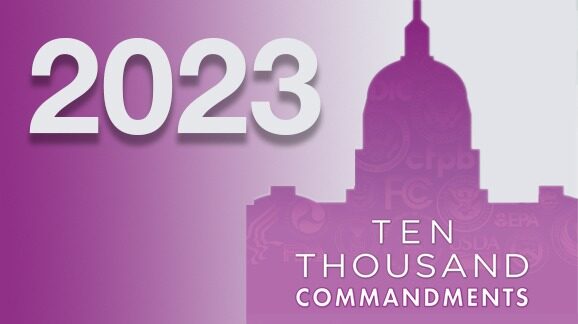Chapter 2: Competition Policy That Exiles Competitive Enterprise Harms Equity
Biden has repeatedly claimed, “I’m a capitalist.” He also rightly says that capitalism without competition is “exploitation.” However the top-down vision Biden promotes, which is embodied in his problematic White House Competition Council, is hardly the building of an economy “from the bottom up and the middle out” that he claims to champion.
These themes were covered in the last edition of Ten Thousand Commandments, so this report looks simply at Biden’s views on administering laws like the CHIPS and Science Act, which Biden claimed “is not handing out blank checks to companies” and would “be laser-focused on the guardrails that’s going to protect taxpayers’ dollars.”
Biden asserts, “We’ll make sure that companies partner with unions, community colleges, technical schools, and offer training and apprenticeships. … We’re going to make sure the work—small and minority-owned businesses get to participate. … Because in this law, I have the power to take back any federal funding from these companies if they don’t meet these requirements.”
This assertion is an attempted political capture of the technology sector. Similar strictures apply in Biden’s barnstorming promotions of the American Rescue Plan and the infrastructure and inflation laws, the Made in America covenants of which are aggravating trade war with U.S. allies. Stricter definitions of prevailing wages to encourage union labor will mean higher prices for consumers. But as Biden remarked of certain of the Bipartisan Infrastructure Law projects in January 2023, “and all of it—all of it is union labor. All of it. Every freaking one, union labor. You all think I’m kidding? I’m not.” Biden’s is a broad vision of regulatory intervention in labor markets, aimed at those outside subsidy recipients. “Here we come,” Biden said to Amazon in an April 2022 unionization pitch.
The infrastructure law doubles down on the coercive renewables transition by, for example, picking winners in commercial-scale battery production for electric vehicles. In October 2022, Biden boasted of giving billions of dollars to 20 companies across 12 states. To get the funding, applicants were asked “how they’re going to partner with community colleges, minority-serving institutions, labor unions, and local organizations to provide job training for workers and benefits for the whole community.”
Biden’s White House Competition Council has also grown more ambitious about sweeping price control regulations, which cause shortages and disrupt supply chains. Targeting prescription drug prices, for example, has been a shared passion of both Biden and Trump. The fourth meeting of the White House Competition Council in February 2023 highlighted several multiagency pushes, including proposals to lower credit card late fees from $31 to $8, end certain hotel and airline charges, and regulate bank overdraft assessments, all charges that Washington calls “junk fees.” Rulemakings are under way on airline ancillary fees with additional rules and guidance in development.
Biden’s economic and social interventions increase the costs of doing business and of creating real, as opposed to government and unionized, contractor jobs. The common denominator of all is the expansion of the spending and regulatory state.
At the CEO Summit of the Americas, an event purporting to peg the “root causes of migration” on not enough government, Biden called for alliances replicating whole-of-government campaigns throughout the Western Hemisphere. “That’s what this is all about,” Biden remarked, “responding to basic human desires that we share for dignity, for safety, and for security.” The “this” to which Biden refers is more central government.
The same occasion found Vice President Kamala Harris imploring the corporate sector to get in line with the wider agenda of government’s taking on ordinary life duties. “Imagine a scenario … a woman in Honduras … single, no kids, no education,” Harris remarked, in the setup of an appeal calling for welfare, international aid, food programs, digital wallets, and subsidized broadband. The administration’s vision also welcomes cross-ocean coordination on antitrust and climate and overseas privacy.
